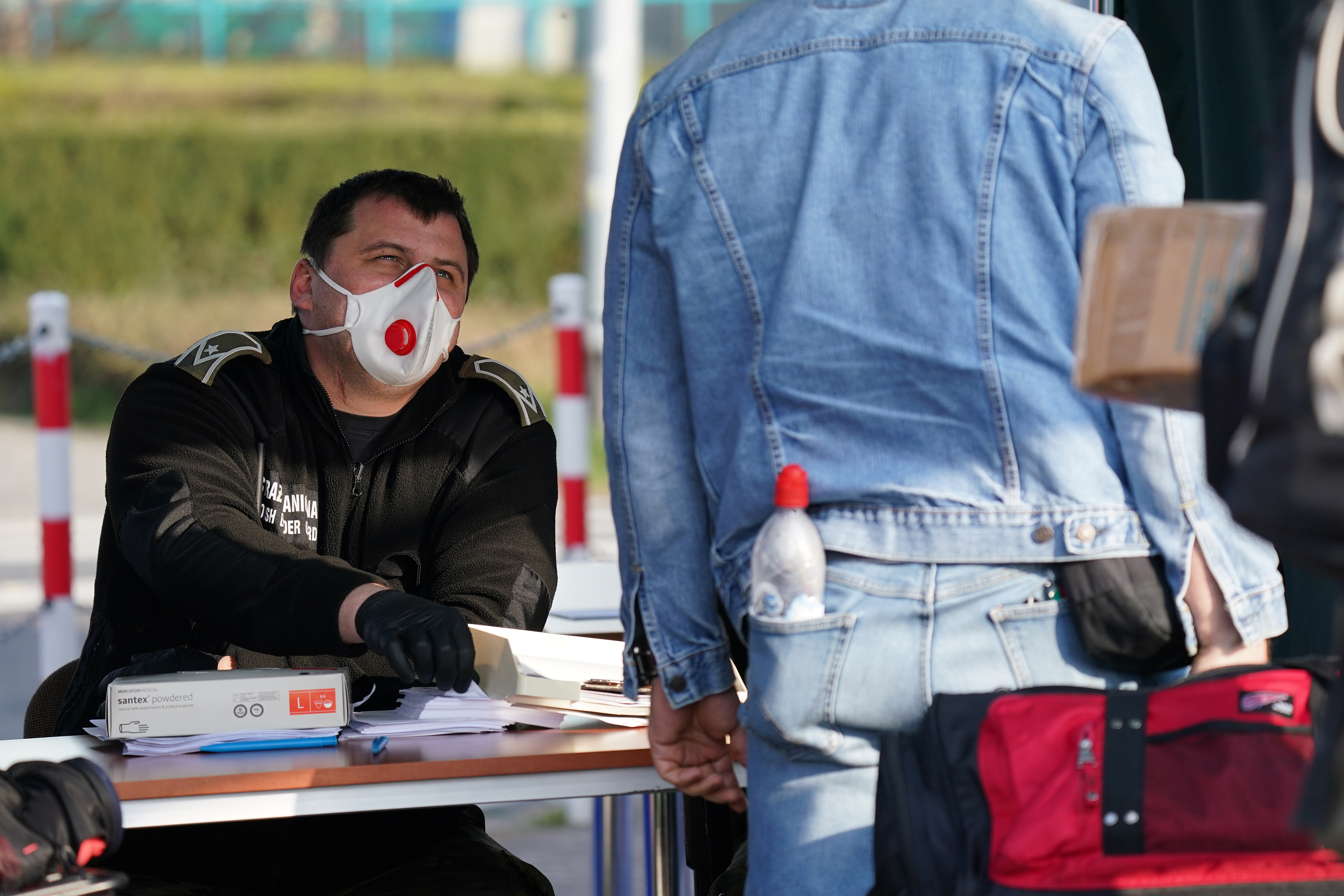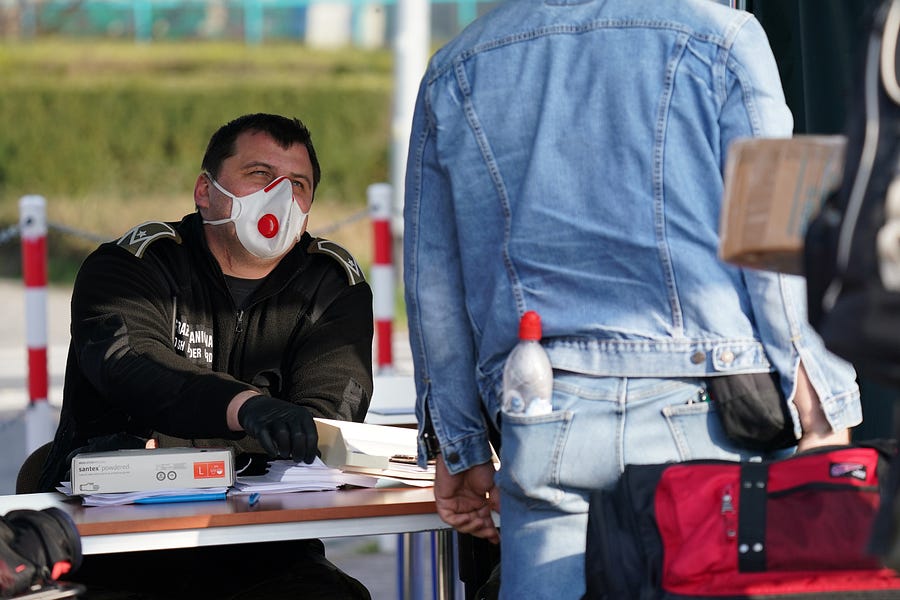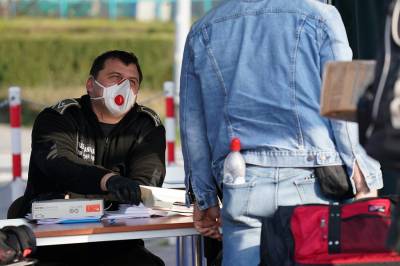
"Papiere bitte!" (Papers please!) is an order that hasn't been uttered in a long time at the border with Germany, but as a citizen of Luxembourg (a small monarchy between Germany, France, and Belgium) I would now hear it if I were trying to enter. Berlin has ordered the closure of the borders to Luxembourg, France, Austria, Denmark, and Switzerland. Guards with masks are checking cars, allowing only daily commuters and government officials to exit and re-enter the country.
According to the Department for Migration and Home Affairs of the European Commission, nine countries have started to reinforce their borders of the outbreak of the coronavirus (COVID-19): Norway, Estonia, Germany, Lithuania, Poland, Switzerland, Czech Republic, Hungary, and Austria. These restrictions apply to varying degrees, and are allowed for an initial time of 10 days under the Schengen Agreement.
The Schengen Agreement, signed in 1985, is a European treaty that abolished existing border checks. Under these rules you can drive from Portugal in the very south of Europe to Estonia in the north without answering the question "business or pleasure?" In airports, traveling within Schengen countries means that the only person checking for ID is the airport staff who verify that ticket information matches the passenger. Those who are not permanent residents or citizens of the EU need to apply for a Schengen visa, granting them access to all signatory countries for a certain amount of time. Schengen visa holders will be checked for their passport only upon entry and exit of the zone, meaning they will also travel between European countries without being stopped by border patrol.
Getting rid of internal border checks is often confused with European Union's freedom of movement, yet it is different: Freedom of movement within the EU means that any EU citizen can move to and live in another EU member state whenever they want, while the Schengen Agreement merely abolished the physical borders. To illustrate this difference: As an EU citizen, I can go to Switzerland (which is not an EU member state) any time I want, but I would still need to apply for permanent residency if I wished to stay. For Ireland, which is an EU member state, yet not inside the Schengen zone, this means that I can move to Dublin anytime I want, but at the border I will be checked for ID.
Granted, the Schengen Agreement is filled with asterisks, which first became apparent when Europe experienced a wave of Islamic terrorism starting in 2015. Participating countries can file for exceptions to the Schengen Agreement if they deem threats to their national security to be overwhelming. In France, following the November 2015 terrorist attacks, President François Hollande instituted mandatory identification checks for arrivals at French airports. Even today, France still has restrictions on the Schengen agreement that keep being extended. In the Northern Hemisphere, Scandinavian countries are enforcing their border due to terrorist threats coming out of Sweden.
The real challenge for this free-moving bloc was the refugee crisis of 2015. Then European Council President Donald Tusk called it "a race against time to save Schengen." Countries that were permissive on granting refugee status -- thereby granting asylum within their own countries -- were unable to guarantee to their neighbors that the people to whom they granted protected status would not cross the border. Adding to that, refugees arriving on the coast of Greece crossed Central European countries such as Hungary in order to get to Germany, which granted the most entries. Fearing that this influx was a threat to its Judeo-Christian heritage, Hungary's prime minister sealed the border, and rejected any compulsory EU refugee redistribution mechanism. The collapse of the Schengen Agreement was only prevented when the EU concluded a migrant deal with Turkey, which guaranteed that fewer migrants were crossing the seas to get to the European continent.
As new migrants are reaching the border between Turkey and Greece, the European Union has taken a tough stance on keeping the border shut, in order to keep the promise of no border checks intact. The reality they face is that they were looking at the wrong problem.
As the coronavirus unfolds, Schengen countries are shutting their own borders. Whether or not they do so because they believe that a coordinated European response would be inefficient, or whether they believe that their own voters wouldn't buy it -- at this stage it's irrelevant. The mere fact that borders have resurfaced in Europe is a failure for the integrity of the Schengen open borders agreement. This hasn't gone unnoticed in Brussels.
In an initial statement, the European Union confronted the travel ban of the Trump administration by condemning it, yet introduced its own travel ban from non-EU states just four days later. "Introduced" insofar an announcement is an introduction: The EU cannot make this decision, it is for Schengen signatories (meaning every country that signed the agreement) to block access for outside travelers. The EU suggested a travel ban for non-EU residents to convince those who have already closed their border internally to re-open them , to little avail. Countries such as Hungary, Poland, and the Czech Republic, are unlikely to take their marching orders from Brussels, if their own state of emergency boosts their confidence level, and security theater shows effectiveness with voters.
Europe is the hotspot of the virus -- not allowing citizens from non-EU states to enter when their numbers are incomparable to the disaster happening in Europe, while arguing that Hungary cannot close its borders to Italians, is inconsistent at best, and euro-centric at worst.
A coordinated EU response to this crisis does not exist, and as the recommendations fall on deaf ears, Brussels is dealing with a crisis of confidence. There is no union-wide crisis response, coordinated testing or research. Worse than that, the EU institutions are bystanders to a war between countries, who are trying to limit exports of medical supplies in order to keep them for themselves. In times of crisis, the true influence and capacity of the EU has shown, and it is very little.
As it stands, countries are dealing with a crisis of missing hospital beds, medical equipment, and overall resources. If the virus ever happens to lay lower than it does now, and the conclusion is drawn that the European Union was a powerless bystander in the eye of the storm (which it is), then the Schengen Agreement and open borders in Europe could be dealing with a difficult recovery.
Bill Wirtz is a political commentator from Luxembourg, covering EU politics and policy. He tweets in German, French, and English at @wirtzbill.
Photograph of a Polish border guard speaking with people at the Polish/German border at the Slubice/Frankfurt crossing on March 17, 2020 at Slubice, Poland, by Sean Gallup/Getty Images.






Please note that we at The Dispatch hold ourselves, our work, and our commenters to a higher standard than other places on the internet. We welcome comments that foster genuine debate or discussion—including comments critical of us or our work—but responses that include ad hominem attacks on fellow Dispatch members or are intended to stoke fear and anger may be moderated.
With your membership, you only have the ability to comment on The Morning Dispatch articles. Consider upgrading to join the conversation everywhere.